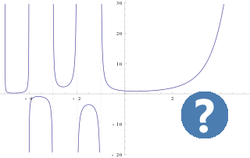Imaginary Factorial
 i
!
What kind of number is described above?
i
!
What kind of number is described above?
Note: i = − 1 and ! denotes factorial.
Image Credit: Wikimedia .
This section requires Javascript.
You are seeing this because something didn't load right. We suggest you, (a) try
refreshing the page, (b) enabling javascript if it is disabled on your browser and,
finally, (c)
loading the
non-javascript version of this page
. We're sorry about the hassle.
4 solutions
actually it should be cos(ln(t)) and sin(ln(t))
Log in to reply
True, although you assume that log is to the base e in this instance.
Log in to reply
Yy, I was just pointing out the fact with the function creation not the notaion itself
We can use Gamma Function ,
Γ ( n ) = ( n − 1 ) ! .
In this case, n − 1 = i ⇒ n = 1 + i .
∴ i ! = Γ ( 1 + i ) , which is a complex number, according to our calculators (currently I can only think of this...) :/
My method is quite raw,but I just used logic: Definition of n!=1x2x3x...x(n-1)x(n) So i!=1x2x3x...x(i-1)x(i), which we can rewrite as Cx....(i-1)x(i) where C is just a constant we get from multiplying all numbers 1x2x3...etc. Assume i!:=Cx(i) => holds as Ci is a complex number. Now assume i!:=Cx(i-1)x(i) => Cx(i^2-i) = Cx(-1-i) which is also complex number. We can spot the pattern that no matter how many terms we have (i)x(i-1)x(i-2)...(i-m) for all m, we will eventually get complex number of we expand the brackets. Hence simplify i!=Cx(a+bi) and knowing that complex numbers are closed under multiplication ( in this case by some real number C) we get i!=a+bi for arbitrary(but non zero) a and b.
Moderator note:
This definition of factorial only applies to non-negative integers. It does not apply to all complex numbers.
This is not a solution
Log in to reply
Elaborate please. If there is a mistake in my assumptions please point it out. Otherwise, I can't see a reason why my method is invalid. Just because I figured it out from abstract point of view?
Log in to reply
I can help you. I think Aryan said that because you cannot apply the normal definition of factorial on imaginary factorial. You can't say that i ! = 1 × 2 × 3 … i because i is an imaginary number and you don't know where i lies on the number line. You need to use gamma function to figure out the answer.
The factorial denotes !. So it's like 1 x 2 x 3 x... When multiplied to i, it becomes unreal number still.
You cannot apply the normal definition of factorial on imaginary factorial. You can't say that i ! = 1 × 2 × 3 … i because i is an imaginary number and you don't know where i lies on the number line. You need to use gamma function to figure out the answer.
Also using your method, how can you determine whether i ! is imaginary or complex?
Log in to reply
The common sense also helps. No matter how many real numbers you could multiply to i, it's still an unreal number.
Log in to reply
What is − i × i ? Is that unreal?
Log in to reply
@Calvin Lin – Sir Calvin, with all respect, what I'm saying is that no matter how many real numbers could be multiplied to an imaginary number, it is still an imaginary number (e.g. even 1 million times i). Definitely, if you multiply an even number of i to each other, they will become real.
Log in to reply
@Lance Fernando – I agree that "multiplying an imaginary number by a real number will always give an imaginary number, no matter how many real numbers are used".
We are saying that i ! = 1 × 2 × 3 × … × i . In particular, note that i ! ≈ 0 . 4 9 8 + 0 . 1 5 5 i isn't an imaginary number, though it is still a complex number.
I don't think you are aware of how the factorial function is being extended from the positive integers to the complex numbers through the gamma function .
Log in to reply
@Calvin Lin – Well Sir, thanks for letting me know about it. For one thing, this kind of problems weren't discussed much in our school - which left me no choice but to partially correctly think of a reason why some problems turn out that way.
Log in to reply
@Lance Fernando – I understand. That's why I point out "here is a misconception / error in your thinking", and so you can fix your reasoning and improve your understanding of the concept.
i ! = Γ ( 1 + i ) = ∫ 0 in f e − t t i d t = ∫ 0 in f e − t e i l o g ( t ) d t = ∫ 0 in f e − t ( c o s ( l o g ( t ) ) + i s i n ( l o g ( t ) ) ) d t = ∫ 0 in f e − t c o s ( l o g ( t ) ) d t + i ∫ 0 in f e − t s i n ( l o g ( t ) ) d t
Hence it's a complex number.